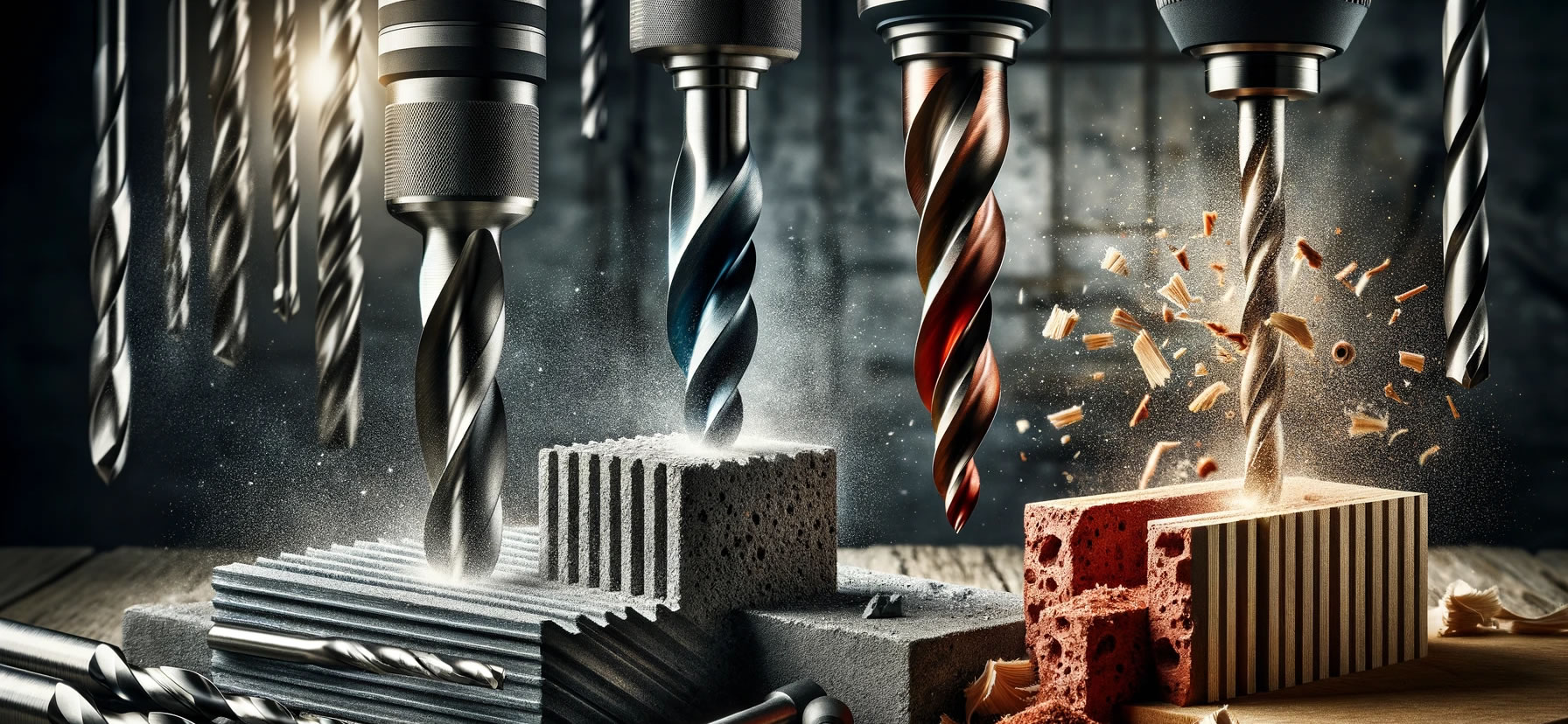Discover the world of drill bits, where a variety of materials and designs cater to specific drilling needs. From the versatile High-Speed Steel (HSS) bits to the precision of Diamond bits, each type has its unique purpose. Whether you’re working with wood, metal, masonry, or specialized materials like glass and ceramics, there’s a drill bit designed to make the job efficient and effective. In this guide, we’ll delve into the diverse landscape of drill bit materials and their applications, helping you choose the right tool for your drilling endeavors.
Understanding Drill Bit Materials:
High-Speed Steel (HSS) Bits
- Material Composition: HSS bits are made from a high-carbon steel alloy that includes elements like chromium, vanadium, and tungsten.
- Characteristics: HSS bits are known for their versatility and durability. They can withstand high heat and maintain their hardness at elevated temperatures.
- Applications: HSS bits are ideal for drilling into wood, plastic, and non-ferrous metals like aluminum and brass. They are commonly used for general-purpose drilling tasks.
Cobalt Bits
- Material Composition: Cobalt bits are made from high-speed steel with a cobalt alloy, typically containing around 5-8% cobalt.
- Characteristics: Cobalt bits are heat-resistant and have excellent hardness. The cobalt content enhances their ability to drill into harder metals like stainless steel and cast iron.
- Applications: These bits are well-suited for drilling hard metals where HSS bits may wear out quickly. They are commonly used in metalworking and automotive applications.
Carbide Tipped Bits
- Material Composition: Carbide tipped bits have a steel body with a carbide tip, which is a compound of tungsten and carbon.
- Characteristics: Carbide tips provide exceptional hardness and wear resistance. They can maintain sharpness even under heavy loads and high temperatures.
- Applications: These bits excel in masonry and concrete drilling due to their ability to handle abrasive materials. They are also used for drilling through hard woods and metals.
Titanium Coated Bits
- Material Composition: Titanium coated bits are typically made of high-speed steel, but they have a titanium nitride (TiN) coating.
- Characteristics: The titanium coating increases the bits’ hardness and reduces friction, enhancing their longevity and performance.
- Applications: Titanium coated bits are versatile and suitable for various materials, including wood, metal, and plastic. They are often used in DIY and general-purpose drilling.
Diamond Bits
- Material Composition: Diamond bits feature industrial-grade diamonds bonded to the tip. They come in various designs, including electroplated and sintered types.
- Characteristics: Diamond bits are exceptionally hard and can drill into extremely hard materials with precision. They have a long lifespan.
- Applications: These bits are essential for drilling into specialized materials like ceramics, glass, and tiles. They are commonly used in construction, jewelry making, and glasswork.
Applications for Different Materials
Woodworking
- Drill Bit Types: Brad Point Bits, Forstner Bits, Spade Bits, Auger Bits
- Applications: These bits are designed for woodworking tasks, creating clean holes, flat-bottomed holes, and deep holes in wood. Brad Point Bits, for example, provide precision in doweling and other woodworking projects.
Metalworking
- Drill Bit Types: HSS Bits, Cobalt Bits
- Applications: Metalworking involves drilling holes in various metals. HSS bits are suitable for softer metals, while Cobalt bits are preferred for harder metals like stainless steel and cast iron.
Masonry and Concrete
- Drill Bit Types: Carbide Tipped Bits
- Applications: Drilling into concrete, brick, and masonry requires carbide tipped bits, which can withstand the abrasiveness of these materials. They are commonly used in construction and renovation projects.
Specialized Materials (Glass, Ceramics, etc.)
- Drill Bit Types: Diamond Bits
- Applications: Specialized materials like glass and ceramics demand the precision and hardness of diamond bits. They are used in creating holes for glassware, tiles, and artistic projects.
Understanding the characteristics and applications of different drill bit materials and types is crucial for successful drilling in various materials and projects.
